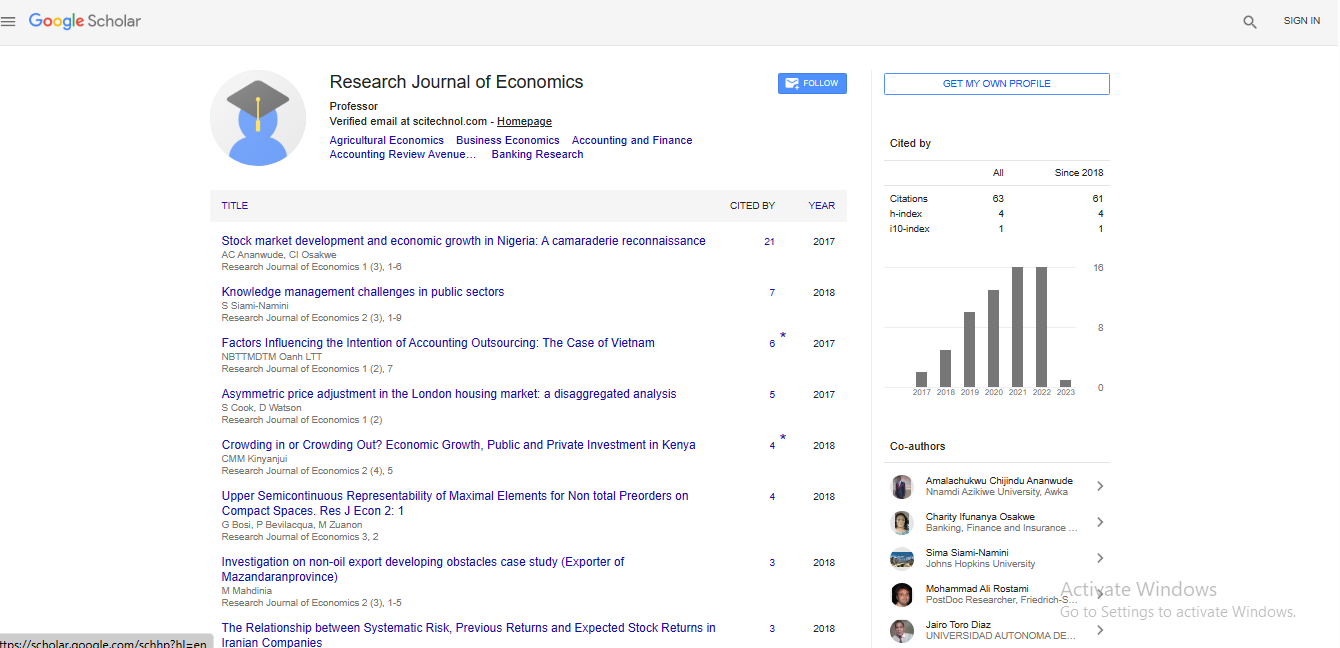Opinion Article, Res J Econ Vol: 7 Issue: 5
Global Logistics Management: Navigating the Challenges of International Trade
Tanmoy Kuo*
1Department of Business Administration, National Taiwan University, Taipei, Taiwan
*Corresponding Author: Tanmoy Kuo,
Department of Business Administration,
National Taiwan University, Taipei, Taiwan
E-mail: kuotan_moy00981234@edu.tw
Received date: 01 September, 2023, Manuscript No. RJE-23-117595;
Editor assigned date: 04 September, 2023, PreQC No. RJE-23-117595 (PQ);
Reviewed date: 18 September, 2023, QC No. RJE-23-117595;
Revised date: 25 September, 2023, Manuscript No. RJE-23-117595 (R);
Published date: 02 October, 2023 DOI: 10.4172/RJE.1000167
Citation: Kuo T (2023) Global Logistics Management: Navigating the Challenges of International Trade. Res J Econ 7:5.
Description
Logistics management plays an important role in today's globalized economy, ensuring the seamless movement of goods and services from suppliers to consumers. It encompasses a wide range of activities, from procurement and transportation to warehousing and distribution.
Importance of logistics management
Effective logistics management is essential for the success of any organization involved in the production and distribution of goods. It directly impacts customer satisfaction, cost control, and overall profitability. A well-optimized logistics system enables companies to streamline operations, reduce lead times, and respond quickly to changing market demands.
Key components of logistics management
Procurement and sourcing: The process of identifying and acquiring raw materials or finished products from suppliers. Efficient procurement strategies can lead to cost savings and higher quality inputs.
Transportation: This involves selecting the appropriate mode of transportation (road, rail, air, and sea) to move goods from one location to another. Effective transportation planning ensures timely deliveries and cost-effectiveness.
Inventory management: Balancing inventory levels to avoid stock outs while minimizing holding costs. Proper inventory management helps to meet demand fluctuations and reduce working capital requirements.
Warehousing: Providing storage facilities to hold inventory temporarily. Warehousing facilitates consolidation, distribution, and order fulfilment.
Order fulfilment: Processing and delivering customer orders accurately and on time are crucial for customer satisfaction and loyalty.
Challenges in logistics management
Supply chain complexity: Globalization has increased the complexity of supply chains with multiple stakeholders, making coordination and communication challenging.
Transportation costs: Fluctuating fuel prices and rising transportation costs pose a significant challenge for logistics managers.
Inventory optimization: Striking the right balance between excess inventory (resulting in holding costs) and insufficient inventory (resulting in stockouts) requires careful planning.
Information technology: Incorporating advanced technology solutions like Internet of Things (IoT), Artificial Intelligence (AI), and Big Data analytics can be daunting but is essential for modern logistics management.
Last-mile delivery: The final leg of the delivery process is often the most expensive and time-consuming. Managing last-mile logistics efficiently is crucial for e-commerce and retail businesses.
Strategies to enhance efficiency and value
Collaborative partnerships: Forming strategic partnerships with suppliers, carriers, and distributors can lead to shared resources, better negotiation power, and improved service levels.
Technology integration: Adopting advanced logistics software and automation tools streamlines processes, optimizes route planning, and enhances real-time tracking, leading to cost savings and improved accuracy.
Lean principles: Applying lean principles in logistics management helps eliminate waste, reduce lead times, and improve overall operational efficiency.
Performance metrics and analytics: Monitoring and measuring Key Performance Indicators (KPIs) enable logistics managers to identify areas for improvement and make data-driven decisions.
Sustainable practices: Implementing eco-friendly logistics solutions not only reduces environmental impact but also resonates with environmentally conscious consumers.
Future trends in logistics management
Block chain technology: Block chain can enhance transparency, traceability, and security in supply chains, reducing fraud and improving trust among stakeholders.
Autonomous vehicles: Self-driving trucks and drones have the potential to revolutionize transportation, improving safety and reducing human errors.
Predictive analytics: Predictive analytics will enable logistics managers to anticipate demand patterns and optimize inventory and transportation accordingly.
Smart warehousing: Automated warehousing systems using robotics and AI will enhance efficiency and accuracy in order fulfillment.
 Spanish
Spanish  Chinese
Chinese  Russian
Russian  German
German  French
French  Japanese
Japanese  Portuguese
Portuguese  Hindi
Hindi 